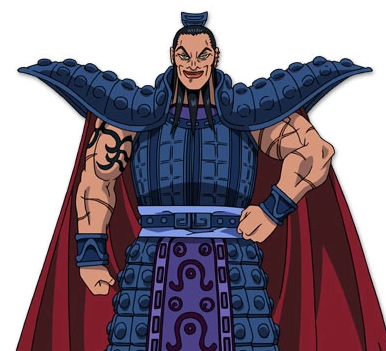
Ou Ki
Ou Ki |
|
|---|---|
 |
|
| Kanji: | 王騎 |
| Romaji | Ō Ki |
| Statistics | |
| Age: | Late 50s |
| Birthday: | Unknown |
| Gender: | Male |
| Portrayed by: | |
| Japanese: | Rikiya Koyama |
| English: | John Novak |
Ou Ki (王騎, Ou Ki), famously known as the “Monstrous Bird of Qin,” was a legendary Great General of the Qin state during the Warring States period. As the leader of the powerful Ou Ki Army, he played a pivotal role in numerous military campaigns and helped establish Qin’s dominance on the battlefield. Ou Ki was the last surviving member of the Six Great Generals of Qin, a prestigious group of military leaders who defined the strength of the Qin military.
His incredible talent as a strategist and commander earned him respect and fear from his enemies. Despite his retirement after King Shou’s passing, Ou Ki remained a legendary figure in Qin’s military history. He was eventually slain in 244 B.C. at the Battle of Kan Plains, where he met his end at the hands of his longtime adversary, Hou Ken, using the Ten Bows of China’s Gi Ka. Ou Ki’s legacy, however, lives on as one of the most formidable generals in Chinese history.
Background

Appearance in Anime
Ou Ki was born into the prestigious Ou Family, a branch of the noble lineage in Qin. His family background gave him the resources and opportunity to rise through the ranks of Qin’s military from a young age. He was revealed to be a cousin of Ou Sen, the current head of the main branch, and a relative of Ou Hon, which further solidified his place in Qin’s military and political structure.
Ou Ki’s military journey began when he was just 13 years old, starting his career as a 100-Man Commander alongside Shou Bun Kun. His extraordinary talent in battle quickly caught the attention of his superiors, and he rapidly ascended through the military ranks. By the time he was an adult, Ou Ki had earned a reputation as one of the most skilled and respected generals of the Qin army.
Throughout his career, Ou Ki played a crucial role in numerous campaigns, often clashing with the most famous and feared military leaders of his time, including Ren Pa, Rin Shou Jo, and the Seven Fire Dragons. His strategic mind and unmatched martial prowess made him a key figure in shaping the military history of Qin.
Appearance
Ou Ki is often depicted as a tall, imposing figure, with an aura of authority and strength that matches his reputation as a Great General. His military attire is typically adorned with symbols of his rank and status, signifying his position as the leader of the Ou Ki Army. He is known for his striking presence on the battlefield, with sharp features that reflect both his strength and wisdom.
In his later years, after his temporary retirement, Ou Ki’s appearance reflected his years of battle-hardened experience. His armor and battle gear were symbolic of the formidable general he had become strong, dignified, and undeniably powerful.
Personality
Ou Ki’s personality was defined by his relentless determination, exceptional leadership, and unyielding pride in his work as a military commander. He was known for his strategic brilliance, using both cunning and direct strength to achieve victory in numerous battles. While he could be ruthless in battle, he had a deep respect for those who fought alongside him and those who earned his admiration.
Despite his fierce persona, Ou Ki had a strong sense of duty and honor. His role in the military was not just about gaining victories but also about ensuring the stability and strength of the Qin state. Though he was often seen as a warrior of overwhelming martial prowess, his intellect and ability to navigate the complexities of warfare made him a revered figure.
Role in the Story
Rise to Power: Ou Ki’s early exploits as a teenage commander set the tone for his legendary career. His talent allowed him to become one of the Six Great Generals of Qin, a title reserved for those who had near-unlimited authority and led Qin’s mightiest campaigns.
Campaigns and Rivals: Ou Ki frequently clashed with some of the strongest figures of the era, including the Three Great Heavens of Zhao, such as Ren Pa, and notable warriors like Rin Shou Jo. He also engaged in fierce battles with the Seven Fire Dragons, participating in conflicts that shaped the balance of power between states.
Support of Ei Sei: Initially neutral after King Shou’s death, Ou Ki returned to the battlefield during a crucial turning point, supporting Ei Sei against internal power struggles and the threat posed by rival factions. His support was pivotal in legitimizing Ei Sei’s claim and uniting the military under the rightful heir.
Final Battle and Death: In 244 B.C., Ou Ki led the Qin forces at the Battle of Kan Plains. Despite overwhelming odds and betrayal by Go Hou Mei, Ou Ki held the line until he was fatally wounded in a one-on-one duel with Hou Ken. His death marked the end of the Six Great Generals era, leaving a massive void in Qin’s military might.
Relationships
Kyou: A fellow general and Ou Ki’s most cherished companion. Her death at the hands of Hou Ken had a lasting impact on Ou Ki.
Ei Sei: The King of Qin, whose vision Ou Ki came to support wholeheartedly.
Shin (Ri Shin): Ou Ki saw potential in Shin and entrusted him with the legacy of his glaive and ideals.